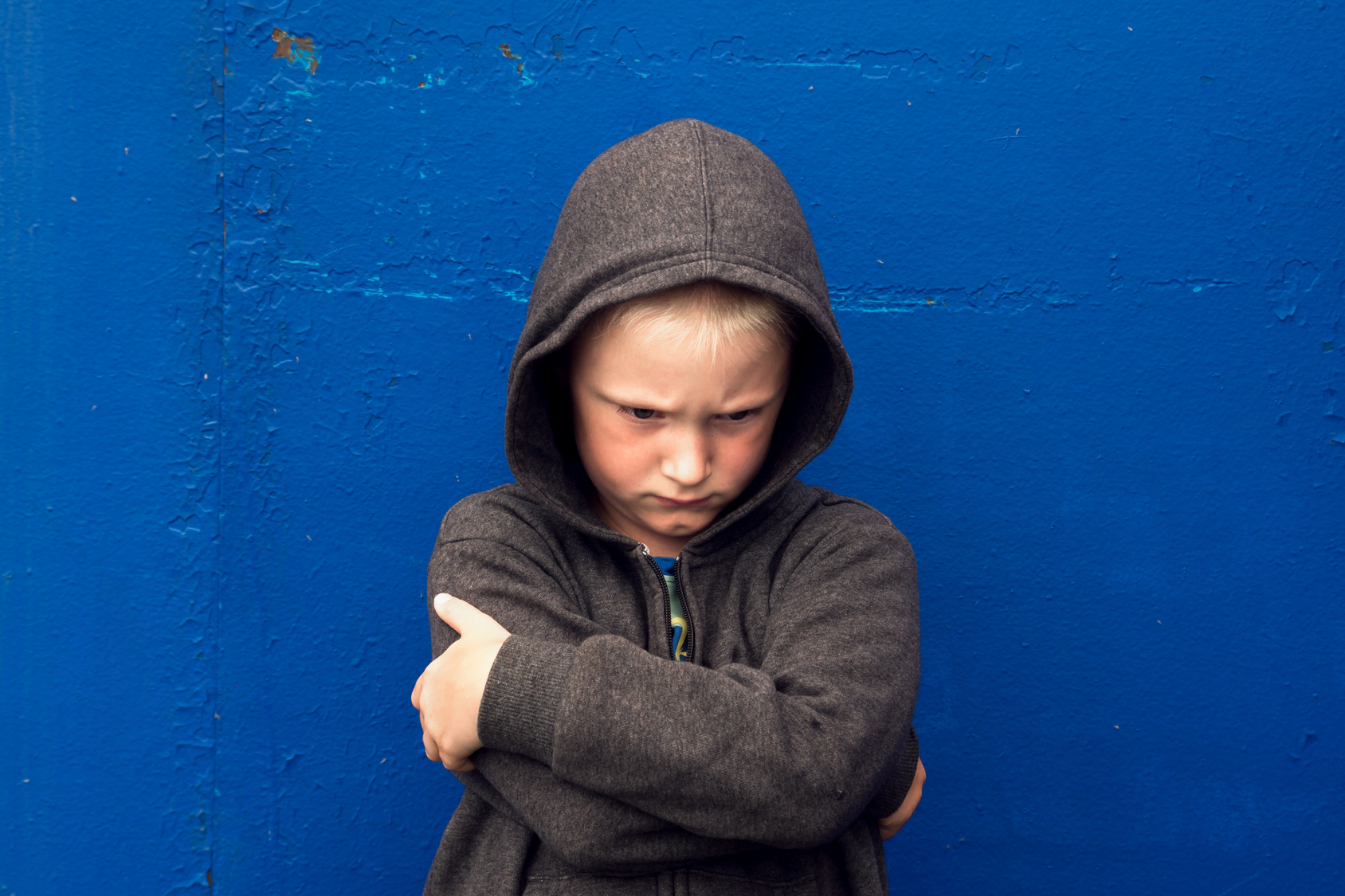Most people think of dysregulated behavior as looking like a kid throwing a temper tantrum — falling out, screaming, running away. But dysregulation comes in many forms, and kids can handle their big feelings in many different ways. Our Behavior Wheel can help you to determine how regulated or dysregulated your child is in the moment, which can also help you to quit taking it personally.
Here are ten behaviors that signal that your child is likely dysregulated:
1. Feeling nervous or jittery
These are perhaps the most expected behaviors when a child is nervous or anxious about something. This can be confusing when the situation does not appear to be dangerous to you (the adult).
2. Irritability or anger
Expressing anger is a normal and natural emotion and it is okay for children to feel angry. That said, it’s important to express it in a healthy way. Pretending to be fine when upset can lead to unpredictable explosions at a later time, while violently lashing out or running away can frighten and alienate the people around you.
3. Feeling numb, disconnected, or disassociated
As mentioned above, most people think of dysregulation as being out-of-control. But it’s not just “fight or flight.” Dysregulation can also result in “freeze” — where a child cannot tune in to their emotions, or feels disconnected from the situation. Just because they are not aggressive or running away does NOT mean they are okay. Freeze is actually the deepest state of dysregulation.
4. Low energy
If your child seems lethargic, sleeps a lot, or just has trouble getting going, it may be a sign of dysregulation. That said, if a child is persistently low energy or has other unusual symptoms, they may be depressed, or have another underlying medical condition that needs to be addressed.
5. Trouble getting started, avoidance / refusal
When a child is struggling with starting something, it can be for a number of reasons. One might be anxiety and a lack of confidence, (“Can I do this?”). Another might be confusion, (“I have no idea how to do this!”). Or it may be that they are nervous about what will happen, (“Something scary might happen if I do this.”). If your child seems to be avoiding, resisting, or putting off a task, see if you can figure out the underlying reason for the avoidance so you can be helpful.
6. Trouble focusing or racing thoughts
Sometimes our kids seem to be thinking about 10,000 things other than the things they actually need to be working on! That can be a sign that something about the task at hand is challenging, though it might also be a sign that they are worrying about something else.
7. Sleep issues (sleeping too much or not enough)
When a child cannot settle their mind due to worry about something, it can be very difficult to fall asleep. Sleep is, in fact, one of the most profound acts of self-regulation that we must regularly do. Being able to sleep at night, and stay awake during the day is critical for functioning. When our kids struggle with these very basic skills, it’s likely a sign that they are struggling with something.
8. Overwhelm
If your child seems chronically overwhelmed by even the smallest tasks, there is likely something going on. Think about it: when you have too much to do, even the regular activities of daily living can feel impossible. But there may be other reasons for overwhelm — perhaps your child doesn’t feel safe at school because of bullying or fear of having to go into lockdown.
9. No motivation
One of the most frightening behaviors of a dysregulated child is a complete lack of motivation. When a child has no sense of agency, they may be unable to do even the most trivial of things that must be done. While this can happen in the moment in response to a single task, it can also become a part of a child’s response to anything challenging. As such, it is a very serious problem when it extends beyond a single task and into every aspect of a child’s life.
10. “Mother hen” — trying to control others
One response children (and adults) can have to feeling out-of-control is to attempt to control everyone around them. Being comfortable with the uncertainty of life, and of the behavior of others, can be extremely challenging for some children. If your child is trying to control everything, consider what they might be worrying about so you can help them.
That’s nice, but how can I help?
To help a child who is dysregulated, it is important to stay calm and show empathy towards their struggle. Try to understand what your child is trying to communicate — ask yourself why they are having a hard time. It can also help to be a calm anchor that your child can regulate with. Practicing strategies like body scans and deep breathing when your child is calm and regulated (outside of those tough moments) can make it easier for your child to use them when they need to stay calm in the moment. Finally, learn to anticipate potential triggers so you can help your child when you see them becoming dysregulated.
Modeling healthy emotional expression yourself can also be a powerful teaching tool for your child. (We like to think of this as “being the change you wish to see.”) Likewise, consider your own energy and stress levels. If you are feeling stressed or overwhelmed, it can be difficult to help your child regulate their emotions. Taking care of yourself and finding ways to manage your own stress can help you be more present and available for your child.





